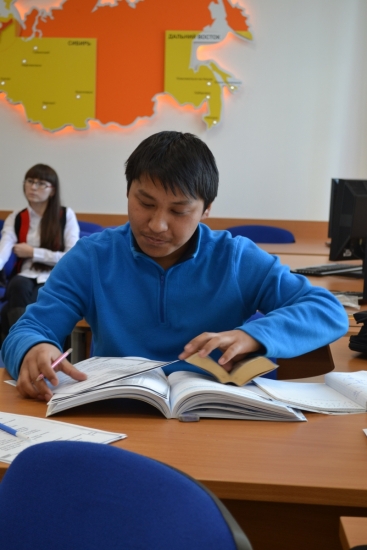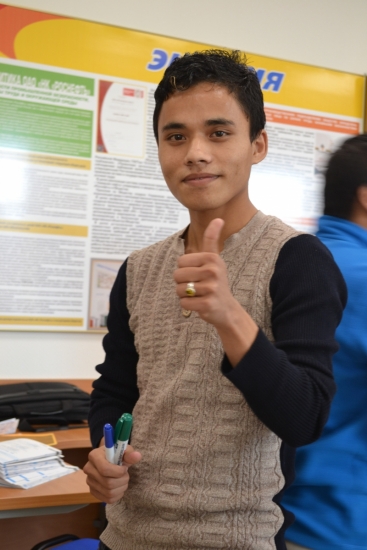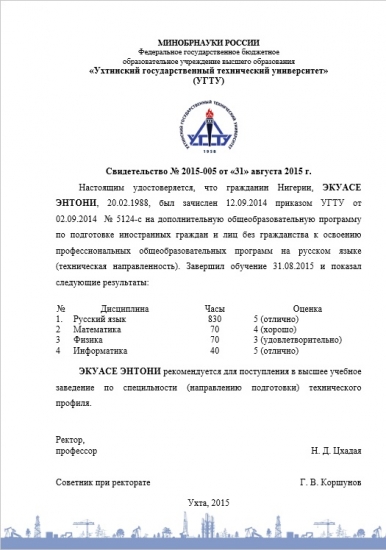Preparatory course
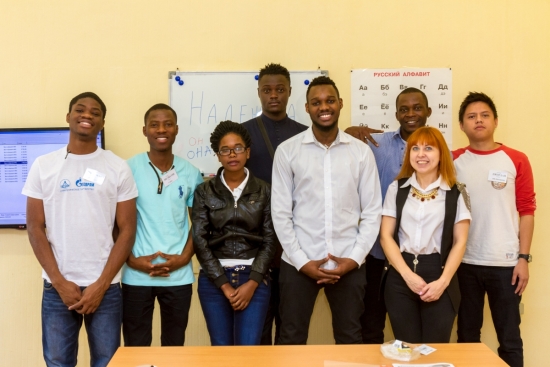
The preparatory course is a subject-specific preparatory course, which is meant to prepare international students for a degree program within one year. It helps to ensure that they can complete their future studies successfully and without delay. As the language of instruction at USTU is Russian only, so the main goal of the course is to teach international students speak, read, write and understand the Russian language. Apart from the intensive course of Russian, they learn other subjects such as Mathematics, Physics and Informatics. More informations about the academic training volume is in the table below.
The academic year of trainings in the preparatory course for international students starts on 1st September and ends on 31st August. The students are trained in one direction - technical.
| Direction | Subjects | Hours | |
Technical |
Russian |
Russian Grammar & Lexis Phonetics Home Reading |
760 40 30 |
|
Mathematics Physics Informatics |
70 70 40 |
||
Academic program:
- the training is done in groups of 8-10 students;
- 6 days a week;
- classes focus on all kinds of linguistic activities (listening, reading, writing, speaking);
- high attention is paid to the development of vocabulary and speaking skills of the Russian language.
At the end of an academic year students pass graduation exams and get the Certificate with their results which can be used for finding a bachelor or master degree at USTU. If a student fails final exams, only the letter of results will be issued.
NOTE! Being admitted to a preparatory course does not mean you have been admitted to any degree program at Ukhta State Technical University. After passing the final assessment test, you must reapply.
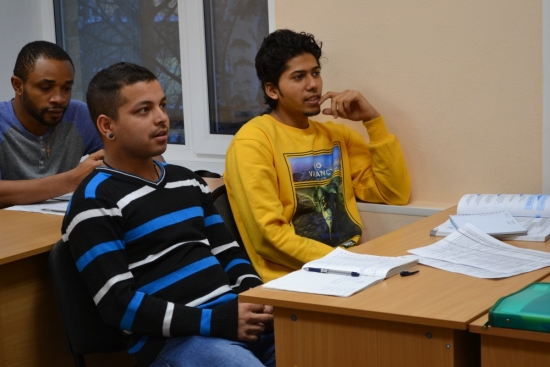
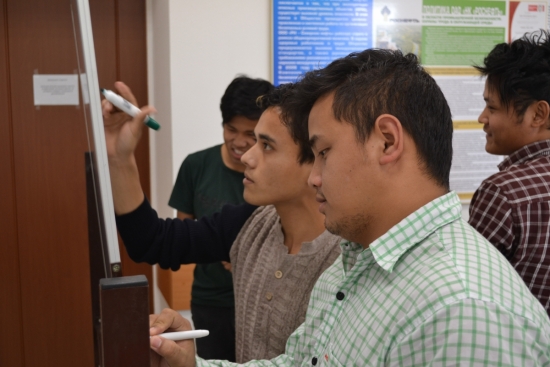
We offer Russian language courses at following levels:
Basic Level
Successful performance in the Basic Level test indicates an initial communicative competence which enables you to satisfy your basic communicative needs in a limited number of situations in everyday and sociocultural areas of communication. To put it easier, you can yourself make purchases in a shop, use the local public transport, discuss the weather with people around, exchange some stock phrases with colleagues and teachers etc.
Official requirements: skills and competences you should have at the basic level in Russian as foreign language:
- be able to read short simple texts from different sources (name of magazines and newspapers, signboards, direction signs, notices etc.); understand the basic and additional information from the adapted cross-cultural, journalistic and social texts;
- be able to write a short letter, a memo, a greeting card etc., to present the main content of the source text with the help of the questions;
- understand the main information (theme, reference to place, time, cause etc.) presented in single dialogues and monologues on everyday and sociocultural topics;
- be able to initiate a dialogue in simple standard situations; maintain the dialogue about yourself, your friends, family, study, job, learning of foreign language, working day, free time, hometown, health or weather and formulate your own statement based on the text you've read;
- use grammar and lexical skills to formulate statements about your plans in a limited number of situations.
The minimum vocabulary should reach 1300 items.
However, the basic competence in Russian as a foreign language is not enough to study at the Russian educational institutions, except for preparatory faculties (programs or courses) for foreigners where future students receive a one-year special language training.
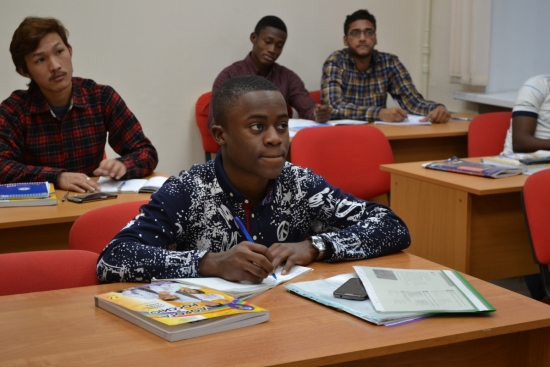
Level 1
Successful performance in the First Level test indicates an intermediate level of communicative competence, which enables you to satisfy your main communicative needs in everyday, sociocultural, educational and professional areas of communication. In other words, you feel more confident in the country where the foreign language is spoken in most routine situations and can come up with a significant number of problems and tasks you encounter in the everyday life. It corresponds to the state standard in Russian as a foreign language.
Official requirements: Level 1:
- be able to read short texts from newspapers, magazines and books; understand the main content of the texts, single details and the author's evaluations;
- be able to write a text of 20 sentences on one of the given topics: yourself, your family, study, learning a foreign language, working day, free time, hometown, health or weather; write a short summery of a text you read or heard on a given topic;
- understand short dialogues and extract factual information (theme, time, relations, characteristics of the objects, purposes, causes); understand expanded dialogues and express your own judgment about the statements and actions of the speakers, understand spoken announcements, news, sociocultural information;
- be able to participate in dialogues in a significantly wide range of everyday situations, initiate, maintain and end a dialogue; speak on different topics (about yourself, your job, profession, interests, country, city, culture etc.); formulate an own statement based on the sociocultural text you've read before;
- use grammar and lexical skills for formulating statements related to the needs arising in simple standard situations.
The minimum vocabulary should reach 2300 items already.
The first level of competence in Russian as a foreign language is enough to enter Russian education institutions, in particular higher education institutions, i.e. universities, institutes and academies. As a rule, this level is achieved by students who have completed the preparatory programs (faculties or courses) for foreigners after one-year special language training.
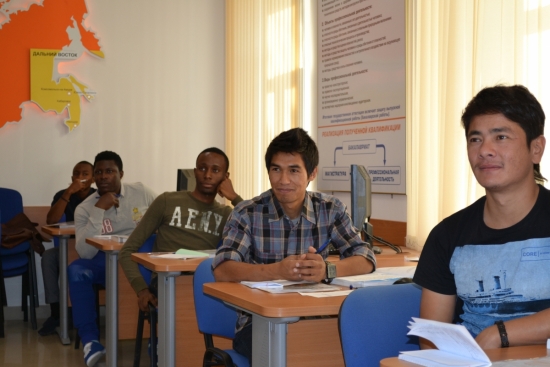
Level 2
Successful performance in the Second Level test indicates a relatively high level of communicative competence, which enables you to satisfy your main communicative needs in all areas of communication and pursue professional activities in the Russian language in the related subject areas: humanitarian sciences (except for philology), engineering, natural sciences etc.
Official requirements: Level 2:
- be able to read various journalistic and literary descriptive or narrative texts with elements of argumentation and combined sorts of texts with a clearly expressed author's position. be able to write plans, thesis or synopsis based on the texts you've read or heard; write own informative texts in form a of private or business letter, as well as official texts (such as applications, requests etc.);
- understand dialogues from everyday communication with clearly expressed positions of the speakers; radio news, advertising; dialogues from feature films and TV programs with clearly expressed relations between the speakers;
- be able to maintain dialogue by implementing the given communication strategy; act as initiator of an interrogation dialogue; speak about what you've seen and express your own view and evaluation, analyze a topic in a free speech situation;
- be able to perceive and use lexical and grammatical language means in an adequate way to ensure the correct linguistic form of the phrase.
The vocabulary minimum should reach 10 000 items.
The second level of competence in Russian as a foreign language is a prerequisite for receiving bachelor's or master's degrees at the Russian higher education institutions (except for bachelor's or master's degree in philology).
*Levels of competence in Russian as a foreign language http://en.russia.edu.ru/russian/levels/
